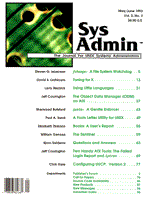
Listing 1: fchange.sh
:
#######################################################
# fchange.sh: log and report upon files that have
# changed. requires fchangedir control directory, logs
# subdirectory, and fchange.files control file.
# Copyright (C) 1993 Steven G. Isaacson
#######################################################
test "$debugxv" && set -xv # primitive debugger
tmpfile=/tmp/fch.$$
: ${HOME:=/usr/stevei}
fchangedir=$HOME/cron/fchange
logdir=$fchangedir/logs
parm_file=${fchangedir}/fchange.files
def_mail_to=stevei ; export def_mail_to
mailer=/bin/mail ; export mailer
subject="On `uname -n` this file was changed recently"
eqsn="======"
PATH=/bin:/usr/bin:/usr/ucb:.:$PATH
export PATH
cd $fchangedir
# use awk to skip comments, blank lines, null lines, and
# colons
awk '/^#|^ |^:|^$/ { next }
{ print }' $parm_file |
while read unique fname mail_to
do
# stop if there is a problem
set -e
logname=${logdir}/${unique}.log
# if the log file isn't there, create it
test -f "$logname" || > $logname
# set tracking flag. default is no
track=no
case "$mail_to" in
*track) track=yes
mail_to=`echo $mail_to | sed 's,track,,'` ;;
esac
# save original number of lines in log file
oldlen=`cat $logname | wc -l`
# those particularly concerned about security may
# also want to add the output from sum (1-SysV) to
# the line. that way, even if the size and time
# stamps are rigged, you'll still see that a change
# was made.
test -f "$fname" && /bin/ls -l $fname >> $logname
# sort the log file uniquely. if the file in
# question hasn't changed, then the line we just
# added with ls is a duplicate and will be removed.
sort -u $logname -o $logname
# get new number of lines in log file
newlen=`cat $logname | wc -l`
# if there is a difference, send mail
test "$oldlen" -eq "$newlen" || {
echo "Subject: $subject ($unique)" > $tmpfile
tail $logname >> $tmpfile
test "$mail_to" || mail_to=$def_mail_to
cat $tmpfile | $mailer "$mail_to"
test "$track" = "yes" && {
echo "#_change $eqsn `date` $eqsn" \
>> ${logname}.track
cat $fname >> ${logname}.track
}
}
done
exit 0
|